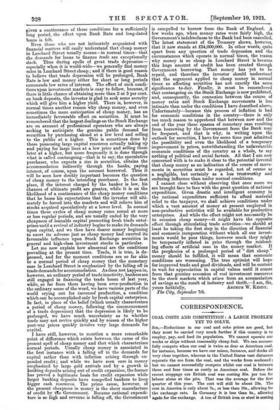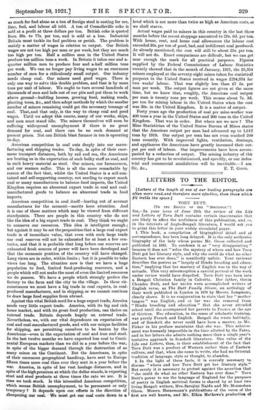CORRESPONDENCE.
COAL COSTS AND COMPETITION : A LARGE PROBLEM YET TO SOLVE.
SIR,—Reductions in our coal and coke prices are good, but they must he carried very much further if this country is to employ, pay, and feed its population. We cannot operate our works or ships without reasonably cheap fuel. We can success- fully compete when our coal is twice as dear as American coal, for instance, because we have our mines, furnaces, and docks all very close together, whereas in the United States vast distances separate the ore from the coal, and the works from seaboard ; but we cannot successfully compete whilst our coal is between three and four times as costly as American coal. Before the recent stoppage our British coal was costing 30s. per ton for labour alone at the pits. That was the average for the first quarter of this year. The cost will still be about 25s. The cost in America is only about 7s., or less than 10s., allowing for the exchange rate. In Germany it is less than 8s., allowing again for the exchange. A ton of British iron or steel is costing
as much for fuel alone as a ton of foreign steel is costing for ore, lime, fuel, and labour all told. A ton of Connellsville coke is sold at a profit at three dollars per ton. British coke is quoted from 30s. to 77s. per ton, and is sold at a loss. Industrial Britain must tackle its fuel problem or perish. The problem is mainly a matter of wages in relation to output. Our British wages are not too high per man or per week, but they are much too high per ton. Half a million men in the United States produce ten million tons a week. In Britain it takes one and a- quarter million men to produce four and a-half million tons per week. We can no longer pay living wages to an enormous number of men for a ridiculously small output. Our industry
needs cheap coal. Our miners need good wages. There is only one way to solve this double problem, and that is by more tons per unit of labour. We ought to turn several hundreds of thousands of men and lads out of our pits and put them to work above ground—building houses, growing food, making roads, planting trees, &c., and then adopt methods by which the smaller number of miners remaining could get the necessary tonnage of coal. That, and that only, is the way to cheap coal and good wages. Until we adopt this course, many of our works, ships, and men must stand idle. The miners themselves will soon be suffering widespread unemployment if there is no great demand for coal, and there can be no such demand at present prices. Not one British blast furnace in ten is operating to-day.
American competition in coal cuts deeply into our manu- facturing and shipping trades. To-day, in spite of their enor- mous transport distances, both by rail and sea, the Americans are beating us in the exportation of such bulky stuff as coal, and in such heavy material as steel. Our miners, our furnacemen, and our seamen suffer. This is all the more remarkable by reason of the fact that, whilst the United States is a self-con- tained and self-supporting country, not needing to export much coal or many manufactures to balance food imports, the United Kingdom requires an abnormal export trade in coal and coal- manufactured goods to balance an abnormal trade in food imports.
American competition in coal itself—leaving out of account manufactures for the moment—merits keen attention. And it is one of those matters which may be viewed from different standpoints. There are people in this country who do not like the idea of a big export trade in coal. They think we ought to conserve our resources. This idea is intelligent enough ; but against it may be set the proposition that a large coal export trade is of immediate value, that even with such large trade our coal reserves will not be exhausted for at least a few cen- turies, and that it is probable that long before our reserves are exhausted fresh sources of power will have been developed and that the economic position of the country will have changed. Long views are in order, within limits ; but it is possible to take views too long. The situation now is that we have a huge population to feed, limited food-producing resources, and a people which will not make the most of even the limited resources we do possess. We have a people which strongly prefers the factory to the farm and the city to the village. In these cir- cumstances we must have a big trade in coal exports, in coal- produced manufactures, and in shipping, or we cannot continue to draw large food supplies from abroad.
Against this vital British need for a huge export trade, America needs very little export trade. America, with its big and rich home market, and with its great food production, can thrive on internal trade. Britain depends hugely on external trade. Nevertheless, we, with our vital dependence on exportation of coal and coal-manufactured goods, and with our unique facilities for shipping, are permitting ourselves to be beaten by the Americans—even, in the exportation of coal and iron and steel. In the last twelve months we have exported less coal to Conti- nental European markets than we did in a year before the war, in spite of the bigger demand through the destruction of so many mines on the Continent. But the Americans, in spite of their enormous geographical handicap, have sent to Europe fifteen times more coal than ever they sent in a year before the war. America, in spite of her vast haulage distances, and in spite of the high premium at which the dollar stands, is exporting steel and steel products at three times the rate we are. It is time we took stock. Is this intensified American competition, which means -British unemployment, to be permanent or only temporary ? It depends upon our efforts in the direction of dwapening our coal. - We must get our coal -costs down to a
level which is not more than twice as high as American costs, or we shall starve.
Actual wages paid to miners in this country in the last three months before the recent stoppage amounted to 29s. 6d. per ton. With house, rent, and home coal allowances the labour cost exceeded 305. per ton of good, bad, and indifferent coal produced. As already mentioned, the cost will still be about 25s. per ton. It will not do. Exact comparisons are difficult, but we can get near enough the mark for all practical purposes. Figures supplied by the Federal Commissioner of Labour Statistics recently showed that in the month of January, 1921, the 20,354 miners employed at the seventy-eight mines taken for statistical purposes in the United States received in wages £294,934 for two weeks' labour. That was slightly less than £7 58. per man per week. The output figures are not given at the same time, but we know that, roughly, the American coal output per man is twenty tons per week. This means about 7s. 3d. per ton for mining labour in the United States when the cost was 30s. in the United Kingdom. It is a matter of output.
Forty years ago the production of coal per mine-worker was 400 tons a year in the United States and 300 tons in the United Kingdom. That was in order. But whero are we now ? The Mine Statistician of the United States Bureau of Mines states that the American output per man had advanced up to 1,012 tons by 1918. Our output per man has not even reached 200 tons recently. With improved lights, ventilation, drainage, and appliances the Americans have greatly increased their out- put per unit of labour. Our improvements have been accom- panied by a reduction of output. The mining industry of this country has got to be revolutionized, and speedily, or our indus- trial and commercial annihilation will be inevitable.—I am, Sir, &c., E. T. GOOD.



































 Previous page
Previous page